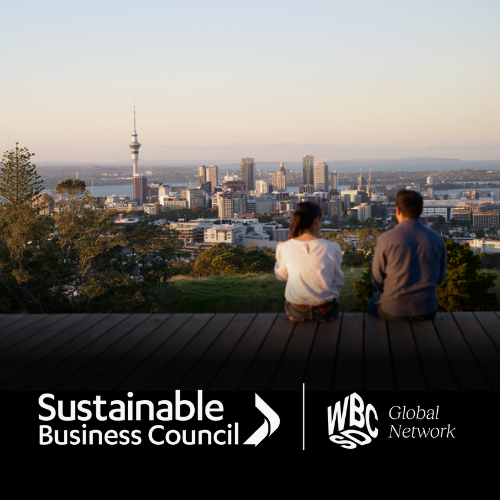The evolving role of CFOs
Sustainability is increasingly turning up in the priorities of executives and directors in our membership, and recent developments mean it is even more significant for Chief Financial Officers. Rob Perry looks at what they need to know and what support is available.
Sustainability is increasingly turning up in the priorities of executives and directors in our membership, and recent developments mean it is even more significant for Chief Financial Officers. Rob Perry looks at what they need to know and what support is available.
October saw the first anniversary of our “Leading from the Top” series. We created the Series in response to growing requests for help from senior leaders in keeping up with emerging sustainability issues. They sought a trusted space to build fellowship, and share insights and learnings about good practice and how you execute it.
Over the last 12 months the series has brought together 190 Directors and executives including CEs, HRDs and CFOs for three events focused on good governance, the Future of Work and climate change. We marked the anniversary with an event on climate-related risk. The event was Chatham House rules, but I can share the key themes.
1.# Volandatory – My word of the day!
“Volandatory” – meaning it’s voluntary, but should be mandatory – or at least according to the expectations of investors, consumers, and the public. It’s a term increasingly being used in the context of reporting climate risk.
Responding to those expectations, Meridian Energy has become the first New Zealand business to report climate-related risk in accordance with the requirements of the Task Force on Climate-related Financial Disclosure (TCFD). Meridian’s leadership is even more impressive when you consider only 4% of businesses worldwide report against 10 of the 11 TCFD recommendations.
TCFD could be considered as just “another reporting framework”. But at the breakfast event, we discussed how climate-relate risk disclosure will likely to become a hygiene factor in maintaining your licence to operate. Much in the same way Health and Safety has become.
In a recent development, we have now seen the Government open consultation on requiring companies to assess and report their climate-related financial risks. Businesses have until 13 December to contribute their views, and we encourage members to have their say.
But for those who have been looking, the signs have been visible for quite some time.
In late 2017 NZX and later the Financial Markets Authority issued revised codes and guidance on good corporate governance. These required businesses to report Environmental, Social and Governance risks on a “comply or explain” basis. This was a small but key step to help New Zealand catch-up to the rest of the world.
And across the ditch, a recent legal opinion in Australia categorised climate-related risks as ‘foreseeable’. The implication for business is that such risks are now regarded as part of Director’s fiduciary responsibilities. They must have oversight of the implications of climate risks, to ensure their businesses thrive and not just ‘survive’.
Meridian’s Climate Risk report:
https://www.meridianenergy.co.nz/assets/Sustainability/e93f942ead/Meridian-Climate-Disclosures-TCFD-Report-FY19.pdf
Practical help on TCFD
-WBCSD CEO Guide to climate-related financial disclosure
-CDSB Good practice handbook
2.How many capitals make up the modern ‘CFO’?
C + F + O = Three? Very funny. It’s more like six. Of course I am referring to financial capital; manufacturing capital; human capital; social and relationship capital; intellectual capital and natural capital. CFOs are now seen more as strategic leaders and custodians of longer term value creation rather than financial stewards of short term shareholder profitability. And sustainability is core to that new role.
Increasingly businesses realise that focussing solely on financial metrics ignores fundamental drivers of change. Up to 80% of the potential value of business is created across non-financial capitals such as environmental and social.
The three ‘must haves’ for a business to staying competitive in a fast-changing world:
1.Move thinking and reporting beyond simple financial metrics (Integrated reporting).
2.Integrate these influences into your business models over time (integrated thinking).
3.Make commitments that you can meet.
Resources
A growing number of SBC members are adopting Integrated thinking and reporting, including early adopters Sanford and NZ Post, and most recently Z Energy, Meridian Energy and Tourism Holdings Limited.
Mike Roan, CFO at Meridian Energy talks more about these issues: podcast.
3.With risk comes opportunity
The complexity and pace of change business is facing means there’s no such thing as business as usual. A key question is how do you bring ‘futures thinking’ into a boardroom’s long-term thinking, when scenario planning is so challenging.
Two key business needs were discussed. Firstly, developing and gaining access to usable data and scientific analysis of that data. This is particularly challenging in the context of climate adaptation given how detailed spatial data needs to be to be useful.
We also heard how businesses are finding new ways of bringing new thinking into governance arrangements. A growing group of organisations, including Westpac and Air New Zealand, have established independent sustainability advisory panels to offer new perspectives and challenge boards and their executive teams. Sustainability steering committees are also common practice, and more importantly they involve many if not all members of the executive team. Comprehensive governance structures mean sustainability becomes integrated with everyday operations.
To assess the maturity to which sustainability is integrated in your business and to identify the practical steps to improve it, check out SBC’s practical good governance guide and matrix
What critical or emerging sustainability issues do you think we should discuss with directors and executives in future events? Let me know: [email protected]
Contact: Robert Perry, Manager, Sustainable Leadership, Sustainable Business Council
Phone:
Email:

